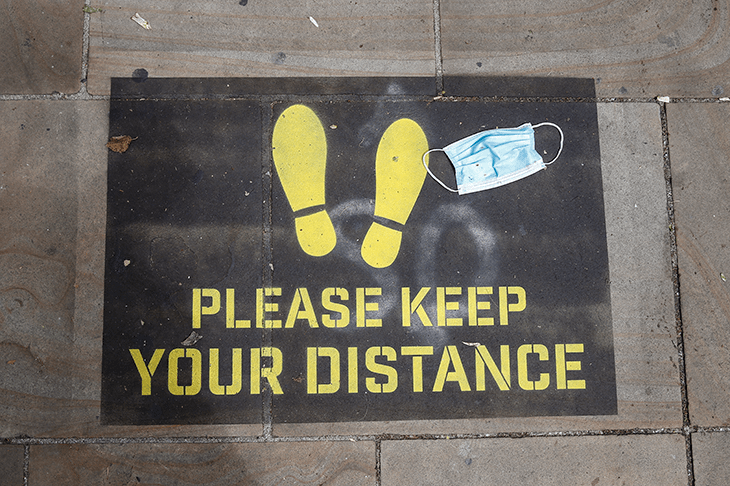When Michael Gove delivered the Ditchley Annual Lecture last month he spoke about why citizens feel that the political system has failed them. ‘The compact leaders offered — trust that we are the best, trust that we have your best interests at heart, and trust that we will deliver — was broken.’ It was a powerful message. Voters have a right to expect honesty and competence from their leaders, not just decisiveness.
So Mr Gove will have thought carefully before saying on television last weekend that face masks should not be mandatory, and people should instead be left to use their own judgment. No one, it seems, told him that the Prime Minister was hours away from asking the police to enforce the wearing of masks in shops with a £100 fine for failure to comply. Polls suggest 60 per cent of the public support this move, but the proportion of government scientific advisers who agree is harder to ascertain.
‘Our advice is clear,’ said Chris Whitty, the chief medical officer, in March. ‘Wearing a mask, if you don’t have an infection, really reduces the risk almost not at all. We do not advise that.’ His deputy, Professor Jonathan Van-Tam, was also emphatic. There is ‘no evidence’, he said, that the wearing of face masks by healthy members of the public slows the spread of the virus. At one stage, companies who advertised masks as a tool against the virus were prosecuted by the Advertising Standards Authority for making misleading claims.
Ministers are introducing edicts that were deemed excessive at the height of the pandemic
Dr Jenny Harries, another of Mr Whitty’s deputies, argued that masks can make things worse because they can be stored in dirty places and become containers for infection. ‘You can actually trap the virus in the mask and then start breathing in,’ she said in March. And yes, Dr Harries did acknowledge there was disagreement between experts about the efficacy of masks, but what does that tell us? ‘The fact that there is a lot of debate means that the evidence either isn’t clear or is weak.’
At the height of the pandemic, No. 10 was keen to say that it was taking the advice of experts and would not be swayed by manias, panic, social media or opinion polls. The Prime Minister rightly pointed out that if governments feel they need to be ‘seen to act’ they can cause harm. His broader point was to give the public confidence that in times of crisis the government would not act as a weathervane and that when the virus subsided things could go back to normal.
Yet now it seems as if focus groups are as influential to this government’s decision-making as scientific advisers. There is little rationale for the quarantines for overseas visitors, but this polls well. There have been U-turns over the test-and-trace system, the now-abandoned app and the return of schools. It is this accumulation of leadership failures which erodes confidence that the government can deliver. The decision to embark on a large shake-up of the civil service midway through a pandemic has only added to a sense of drift. This, as Mr Gove says, goes back to trust.
There has been talk, for example, that masks will now be made compulsory even in offices. Government sources say this is improbable, but as Mr Gove can attest, things change fast. And the confusion goes beyond face masks.
Last week, the Prime Minister said that the ‘stay at home if you can’ advice should be changed to ‘go to work if you can’, but was he talking ex officio, or off the cuff? It was hard to tell as the official advice remained unchanged. Robert Buckland, the Justice Secretary, later sought to clear up the confusion. ‘The guidance is work from home if you can,’ he said. But ‘the message is, yes, come back to work’. How is any employer supposed to make plans on this basis?
Masks, it seems, are not being made mandatory for public health reasons but to inspire confidence to get people out and about. But there is a risk that this will backfire: that masks will reinforce the idea that the virus is still very much at large. Covid-19 has now receded in the vast majority of the country. The official estimate is that 0.03 per cent of the population of England have the virus. This means you would have to meet almost 4,000 people in a shop to stand a reasonable chance of coming into contact with someone with Covid-19, let alone catching it. Such facts can help put things into perspective.
But rather than publicise such numbers, ministers introduce edicts and restrictions that were deemed excessive at the height of the pandemic. This risks sending another message: that the threat is perhaps larger than is being let on. Surely it would be better, as Mr Gove originally suggested, to have an honest conversation over the data, the risks and the extent to which masks are likely to help. Reluctance to do so would suggest a lack of respect for the electorate, or people’s ability to draw their own conclusions.
The Prime Minister recently said that the public could forgive ministers making mistakes on the way into the pandemic, but would not forgive blunders made on the way out of it. He may be about to test the second part of this theory.






Comments